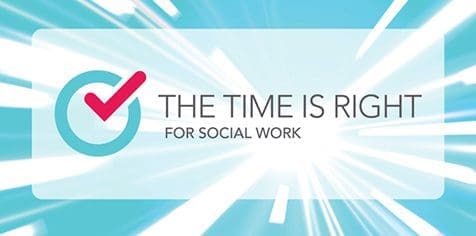 Healthy Connections Community Health Network and Evolve Behavioral Health and Medication Management is helping celebrate this year’s Social Work Month in March with the theme “The Time is Right for Social Work” to highlight how social workers have enriched our society for more than a century and how their services continue be needed today.
Healthy Connections Community Health Network and Evolve Behavioral Health and Medication Management is helping celebrate this year’s Social Work Month in March with the theme “The Time is Right for Social Work” to highlight how social workers have enriched our society for more than a century and how their services continue be needed today.
The annual Social Work Month campaign is a time to show our appreciation for and to inform public, policymakers, and legislators about the services social workers provide in an array of sectors, including our community health centers.
There are almost 720,000 professional social workers in our nation, but that number is expected to rise to more than 800,000 by 2030, the Bureau of Labor Statistics said. Social workers have helped drive significant, positive changes in our nation. Social workers such as social reformer Jane Addams, former Labor Secretary Frances Perkins, and civil rights leaders Dorothy Height, Whitney Young and Ida B. Wells have pushed for voting rights, equal rights, Social Security, unemployment insurance, and other programs.
Social workers touch millions of lives each day and it is likely a social worker at some time will assist you, a family member, or a friend. For example, are you a student who needs athletic shoes to participate in sports, but your parents can’t afford to buy them? Talk to your school social worker. They can help you find the resources you need. Do you want a better relationship with your spouse, partner, children, or parents? A social worker can help you forge stronger connections.
Are you living with depression, anxiety, or a substance use disorder? A social worker can help you overcome them and thrive. At Evolve, Licensed Clinical Social Workers (LCSW) provide individual family, and group mental-health therapy in our communities.
Visit www.evolvebhs.com to learn more about our social workers and the services they provide.
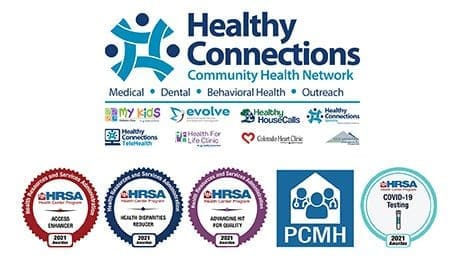 Healthy Connections, Inc. is being recognized for its quality improvements during the past year.
Healthy Connections, Inc. is being recognized for its quality improvements during the past year.
Health Resources and Services Administration (HRSA) has named Healthy Connections a recipient of five of its Community Health Quality Recognition (CHQR) awards. These awards are presented for showing notable quality improvement in areas of access, quality, health equity, and health information technology. In addition, Covid-19 awards were also introduced to recognize health centers’ contributions to the public health emergency response.
Healthy Connections was recognized as:
- Access Enhancer. Health Centers that increase the total number of patients they serve and the number of patients who receive at least one comprehensive service (mental health, substance abuse, vision, dental, and/or enabling) by at least 5 percent.
- Health Disparities Reducer. Health Centers that meet or exceed Healthy People (HP) goals in the areas of low birth weight, hypertension, or uncontrolled diabetes for at least one racial/ethnic minority group, and demonstrate at least a 10 percent improvement in areas of low birth weight, hypertension, or uncontrolled diabetes for at least one racial/ethnic group.
- Advancing HIT for Quality. Recognizes Health Centers that meet all criteria to optimize HIT services that advance telehealth, patient engagement, interoperability, and collection of social determinants of health to increase access to care and advance quality of care.
- Patient-Centered Medical Home (PCMH). Recognizes health centers with PCHM recognition in one or more delivery sites.
- Covid-19 Testing. Recognizes health centers that tested more than 50 percent of their 2020 reported UDS patient populations from April 10, 2020, to July 2, 2021, and have a response rate of at least 50 percent to the weekly Health Center Covid-19 Survey.
Healthy Connections is a Mena-based Community Health Network with locations throughout southwest and central Arkansas. Since its founding as a home-visiting program in 1998, Healthy Connections has been able to provide much-needed health, dental, behavioral health, and social services to families of every lifestyle. Services include primary care/family medicine, specialty services including cardiology, podiatry, and women’s health, My Kids Pediatric Clinic, Evolve Behavioral Health Services and Medication Management, Health For Life Clinic, Healthy Families Arkansas Polk, and Garland counties, and more.
Learn more about Healthy Connections at www.healthy-connections.org.
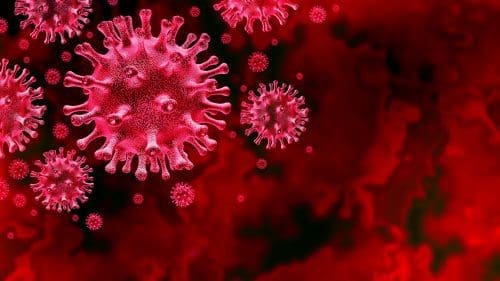
Due to supply shortages, Healthy Connections Community Health Network is now instituting some new policies related to Covid-19 testing and Monoclonal Antibody Treatment.
Covid-19 rapid testing is no longer available. All tests will now get sent to the lab and you will receive results in 2-5 days. This testing will continue to be done at no cost to patients and can be done at all Healthy Connections clinic locations. Visit www.gettestedfree.com for more information.
Healthy Connections is now offering only the infusion option for Monoclonal Antibody Treatment. Patients MUST HAVE A POSITIVE COVID-19 TEST in order to be eligible. The Covid-19 home test is not sufficient for this. Call 888-710-8220 to get a qualifying Covid-19 test.. This treatment is successful in many patients who are considered high risk for severe Covid-19, including hospitalization or death.
Due to changes from the government and insurance companies, we are now only able to offer a cash price for Regeneron infusions. The cash price is $400 and must be paid before the services are received. It can be paid by cash or credit card. This applies to all patients, including insured, uninsured, and sliding-fee scale.
Patients should call our hotline at 479-437-3300 for more information. Referrals are being accepted from any provider, even if you are currently outside of the Healthy Connections Community Health Network.
Healthy Connections will be administering Regeneron at the following locations:
The Healthy Connections team will administer monoclonal antibodies with a one-time intravenous (IV) infusion. The IV infusion involves placing a needle in a vein and gradually sending the medicine through the IV and into the body. The infusion takes between 20 and 50 minutes. After the IV is removed, patients must wait at least one more hour so health care workers can watch for side effects or negative reactions. Intravenous infusion is recommended for patients who have tested positive for Covid-19.
This is not a substitution for the Covid-19 vaccination. Call 888-710-8220 to schedule vaccination appointments at your nearest Healthy Connections Community Health Network location. Patients can learn more and schedule appointments by speaking to their Healthy Connections provider by calling our hotline at 479-437-3300. More information can be found at https://healthy-connections.org/monoclonal.
Covid-19 vaccines and boosters will still be given at all Healthy Connections primary care locations. Call 888-710-8220 for information and appointments.
 Healthy Connections Community Health Network and Evolve Behavioral Health and Medication Management is helping celebrate this year’s Social Work Month in March with the theme “The Time is Right for Social Work” to highlight how social workers have enriched our society for more than a century and how their services continue be needed today.
Healthy Connections Community Health Network and Evolve Behavioral Health and Medication Management is helping celebrate this year’s Social Work Month in March with the theme “The Time is Right for Social Work” to highlight how social workers have enriched our society for more than a century and how their services continue be needed today.



 Healthy Connections, Inc. is being recognized for its quality improvements during the past year.
Healthy Connections, Inc. is being recognized for its quality improvements during the past year.
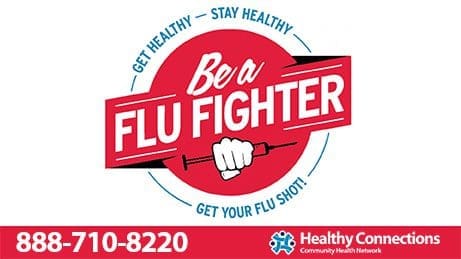 Because of the Covid-19 pandemic, reducing the spread of respiratory illnesses like seasonal influenza (flu) are more important than ever. Vaccination against both the flu and Covid-19 is essential to meet our community’s public health needs, to prevent further disease spread, and to protect vulnerable populations like the elderly, the immunocompromised, and people not yet old enough to receive the Covid-19 vaccine.
Because of the Covid-19 pandemic, reducing the spread of respiratory illnesses like seasonal influenza (flu) are more important than ever. Vaccination against both the flu and Covid-19 is essential to meet our community’s public health needs, to prevent further disease spread, and to protect vulnerable populations like the elderly, the immunocompromised, and people not yet old enough to receive the Covid-19 vaccine.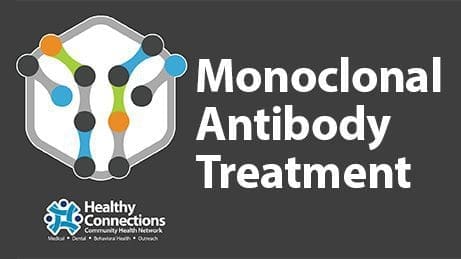
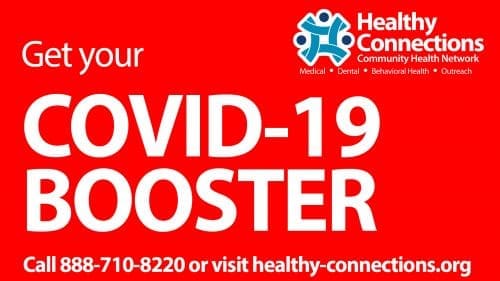 It’s pretty pleasing when someone boosts your morale. It might give you a confidence boost. If your battery dies, you might need a boost. A spacecraft needs boost-er rockets to lift off. Here’s an opportunity to boost your chances of getting the most severe Covid-19 symptoms.
It’s pretty pleasing when someone boosts your morale. It might give you a confidence boost. If your battery dies, you might need a boost. A spacecraft needs boost-er rockets to lift off. Here’s an opportunity to boost your chances of getting the most severe Covid-19 symptoms.